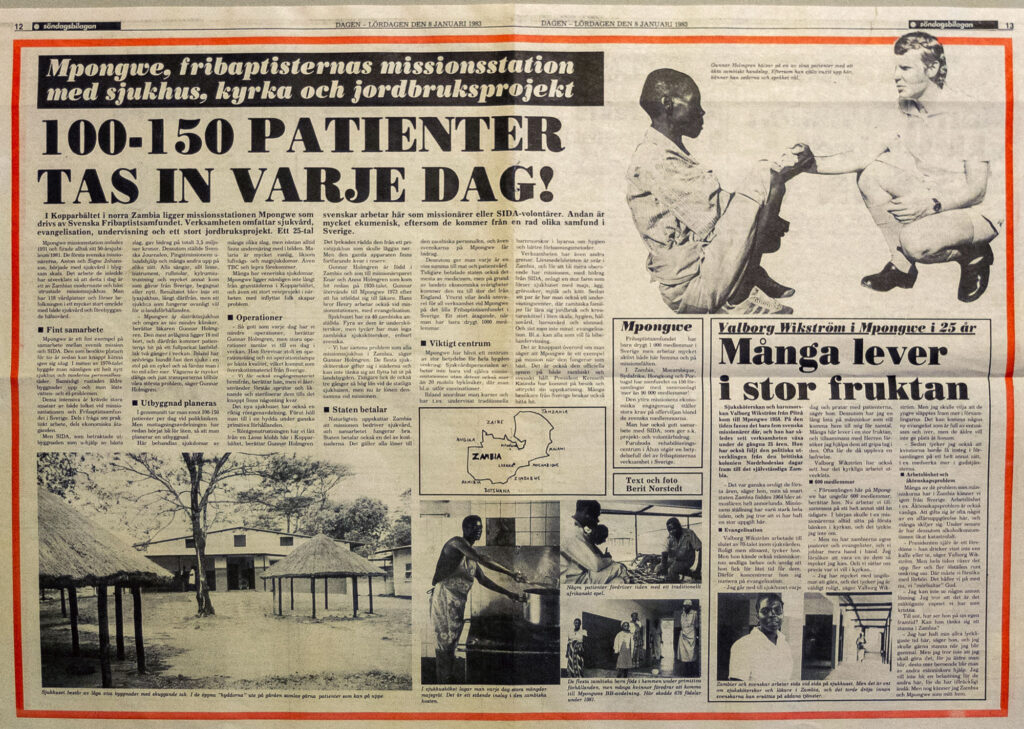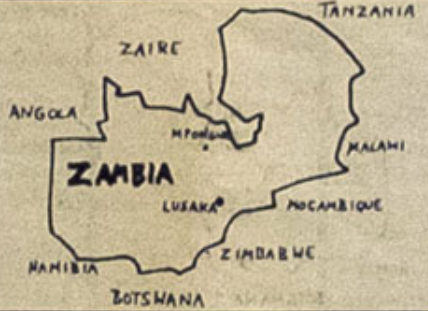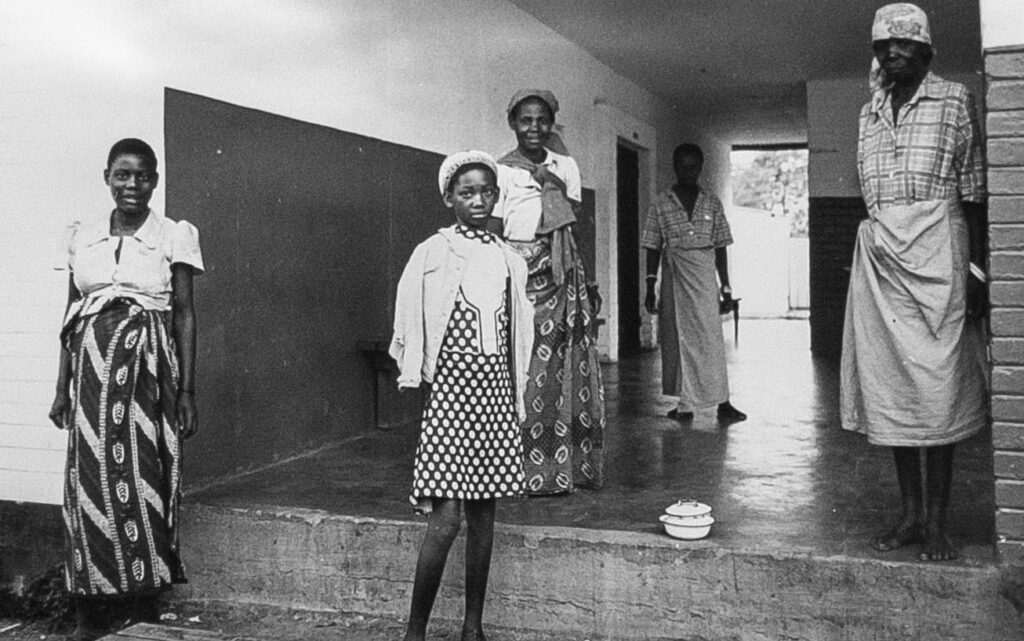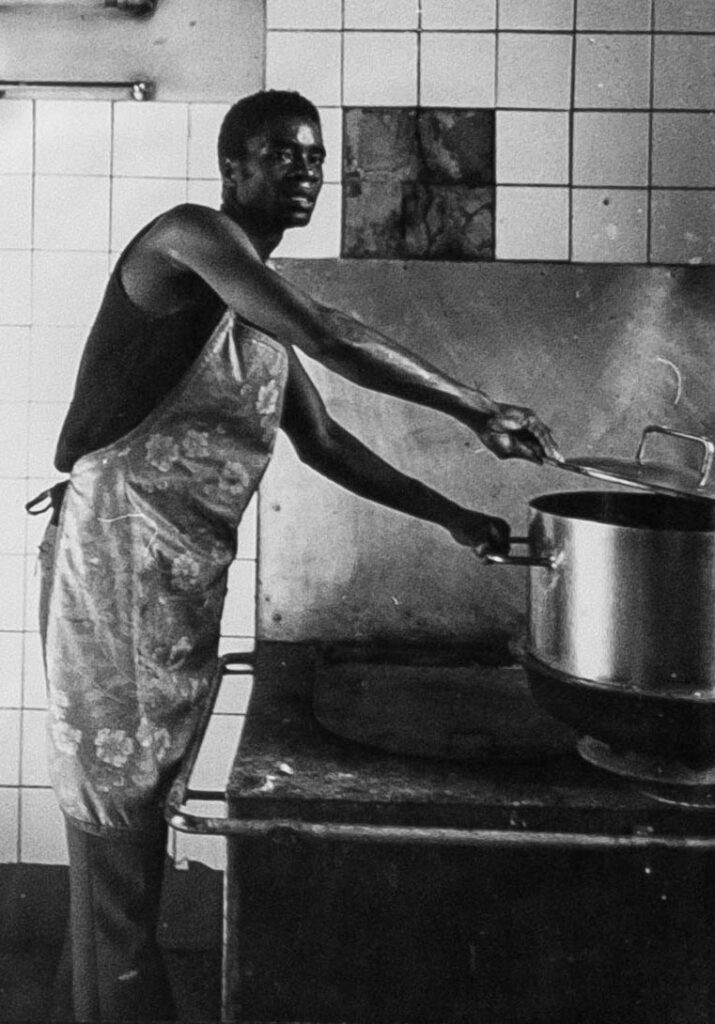100-150 patients are admitted every day!
Mpongwe mission station was established in 1931 and thus celebrated its 50th anniversary in 1981. The first Swedish missionaries, Anton and Signe Johansson, started with health care on a modest scale. The work they started has developed so that today this is one of Zambia's most modern and best equipped mission hospitals. It has 118 care places and provides the population in a very large area with both medical care and preventive health care.
Nice collaboration
Mpongwe is a fine example of cooperation between the Swedish mission and SIDA. Anyone who visited the place ten years ago can hardly recognize themselves today. In the mid-1970s, a brand new hospital and modern staff housing were built. At the same time, older buildings were equipped and the water and electricity problems were solved.
These intense years required great efforts from both the people at the mission station and the Fribaptist Samfundet in Sweden. Partly in terms of practical work, partly financial commitments.
But SIDA, which regarded the expansion as U-aid of the best kind, gave a contribution of a total of SEK 3.5 million. In addition, Svenska Journalen, Pingstmissionen ulandshjalp and many others stood up in different ways. All beds, all linen, instruments, wheelchairs, cold room equipment, and much else came as gifts from Sweden, used or new. The result was not a luxury hospital, far from it, but a hospital that works unusually well for developing country conditions.
MP3 files
Audio tape with interviews from Mpongwe by Berit Norstedt recorded 1980-10-04 – 05. In addition, auto-transcribing is available in .srt files (NOTE! not proofread).
Anders Ivarsson (.srt)
Gunnar Holmgren (.srt)
Lilian Svensson (.srt)
Valborg Wikström (.srt)
- Mpongwe is a district hospital and is surrounded by nine smaller clinics, says doctor Gunnar Holmgren. The furthest one is 18 miles away, and from there the patients come here on a fully packed truck bed twice a week. Sometimes relatives have tied the sick person to a chair on a bicycle and so they travel for ten miles or more. The roads are very bad and transport is one of our biggest problems, says Gunnar Holmgren.
Expansion is planned
On average, 100-150 patients are received per day at the outpatient clinic. But the reception department has already started to get too small, so an extension is being planned.
Diseases of many different kinds are procured here, but malnutrition is almost always included in the picture. Malaria is very common, as are respiratory and stomach diseases. TB and leprosy also occur.
Many have venereal diseases. Mpongwe is not far from the mining towns in the Copper Belt, and even a large wheat project nearby with displaced people creates problems.
Operations
- Almost every day we have minor operations, says Gunnar Holmgren, but we combine major operations into one day a week. He proudly displays an operating bed and an operating lamp of the best quality, which came as surplus material from Sweden.
- We also get disposable equipment from home, he says, but of course we again use syringes and the like and sterilize them until there is hardly anything left.
The new hospital also has a real X-ray department. Before, people lived in a hut under rather primitive conditions.
- We got the X-ray equipment from a Lions club here in the Copper Belt, says Gunnar Holmgren. It managed to save it from a private hospital that was about to close down. But the old device is still in reserve.
Gunnar Holmgren was born in Zambia and the son of the missionary couple Enar and Anna Holmgren who came here as early as the 1930s. Gunnar returned to Mpongwe in 1973 after training as a doctor. His
brother Henry also works at the mission station, with evangelism.
The hospital has about 40 Zambian employees. Four of them are assistant nurses, but unfortunately there are no Zambian nurses, only Swedish.
- We have the same problem as all mission hospitals in Zambia, says Gunnar Holmgren. Most nurses get married in the cities and cannot imagine moving here to the countryside. Earlier they also received three times the salary at the government hospitals, but now the salary is the same at the mission.
The state pays
Of course, Zambia appreciates that the mission provides healthcare, and the cooperation works well. The state also pays part of the costs. This applies to all salaries for the Zambian staff, and the Swedes at Mpongwe also receive a subsidy.
In addition, a certain amount is given each year for food and patient care. In the past, the state also paid for most of the medicine, but due to the country's economic difficulties, it now comes largely from England. Ultimately, however, the responsibility for all activities at Mpongwe rests with the small Fribaptist Samfundet in Sweden. A big undertaking, when you only have about 1,000 members.
Important center
Mpongwe has become a center of great importance for the entire surrounding area. The medical staff not only work at the mission station itself, but also run more than 20 mobile village clinics, where they e.g. perform vaccinations.
Sometimes you organize courses and have e.g. taught traditional midwives in the villages about hygiene and better birthing methods.
The business also has other branches. The food shortage is severe in Zambia, and in order to become more independent, the mission, with a grant from SIDA, has built a large farm that supplies the hospital with maize, eggs, vegetables, milk and meat. For a couple of years now, they have also had a teaching centre, where Zambian families can learn small-scale farming and animal husbandry, hygiene, health care, child care and sewing.
And last but not least: evangelism. Among other things can anyone who wants to receive Bible instruction.
It is hardly an exaggeration to say that Mpongwe is an example of mission at its best. This is also the official view on both the Zambian and Swedish sides. President Kenneth Kaunda has come to visit and expressed his appreciation. Many visitors from Sweden usually also find their way here.
Valborg Wikström in Mpongwe for 25 years
Many live in great fear
Nurse and midwife Valborg Wikström from Piteå came to Mpongwe in 1958. At that time there were only five Swedish missionaries there, and she has thus seen the business grow over the past 25 years. She has also followed the political development from the days of the British colony of Northern Rhodesia until the independent Zambia.
- It was quite anxious in the first years, she says, but as soon as the state of Zambia was born in 1964, the atmosphere became completely different. The position of the Mission has been strong all along, and I think we have had a great task here.
Evangelization
Valborg Wikström worked until the end of the 70s in healthcare. Fun but tiring, she thinks. But she also felt the spiritual needs of the people and felt that she had too little time for them. That is why she now concentrates mainly on evangelism.
- I'm going down to the hospital. every day and talk to the patients, she says. In addition, I have a long list of people who want to come to my house for talks. Many here are living in great fear, and together with the Lord I am trying to help them grasp it. Often they then get to experience a liberation.
Valborg Wikström has also seen how church work has developed.
600 members
- The congregation here at Mpongwe has approximately 600 members, she says. Now we work together in a completely different way than before. In the beginning, for example, the missionaries would always sit in the first pew in the church, and I didn't like that.
- But now the Zambians have their own pastors and evangelists, and we work more hand in hand. I try to be one of them as much as I can. And we sit exactly where we want in church.
- I have a lot to do with young people, and I find that very funny, says Valborg Wikström. But I would like the younger ones to be released more in the congregations. There may come some new evangelist who is full of enthusiasm and zeal, but the elders do not want to make room for him.
- Then I also think that the women should be allowed to enter the congregation in a completely different way, for example participate more in the church services.
Unemployment and marital problems
We recognize many of the problems that people have in Zambia from Sweden. Unemployment e.g. Marital problems are also common. Getting married is often something of a business deal here, and many divorce. In recent years, alcohol consumption has also increased catastrophically.
- The president himself is an example - he certainly doesn't even drink coffee or tea, says Valborg Wikström. But all the time, more and more beer places are springing up around us. There we must try intercession. That is what we are doing now, we are "beating" God.
- I can't see any other solution. I believe it is the most powerful weapon we have as Christians.
Finally, how does she see her own future? Can she imagine staying in Zambia?
- I have had my happiest time here, she says, and I would like to stay when I grow old. But I don't think I should, because the older you get, the more dependent you become on other people's help. I don't want to be a burden to the others here, because they have enough anyway. But I probably know Zambia and Mpongwe as my home.







